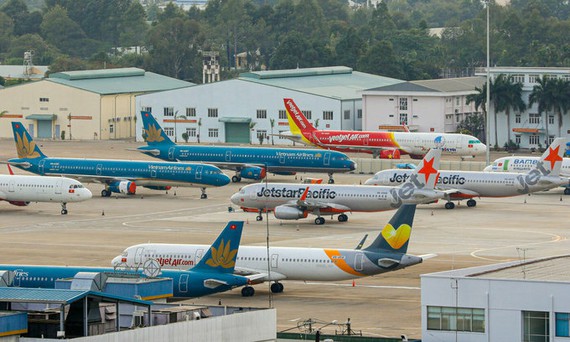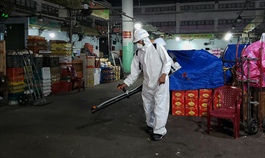Aviation needs boost similar to other industries
Aviation needs boost similar to other industries
The Vietnam Aviation Business Association (VABA) estimates that in the year 2020, domestic airlines bore a loss of more than VND 18,000 bn, a sharp decrease of about VND 100,000 bn in revenue compared to 2019.
Ảnh minh họa.
|
Airlines have had to transfer assets and many investments and finances accumulated over the years to bolster cash flow in 2021. However, the risk of running out of operating cash flow is very likely now. In a recent report to the Ministry of Planning and Investment, VABA said short-term and due debts of three airlines Vietnam Airlines, VietJet Air, and Bamboo Airways amounted to VND 36,000 bn. In the first two quarters of this year, aviation revenue decreased, specifically in May and June, when it decreased by 90% compared to the same period in 2020.
Faced with this situation, VABA has written to the Government to find more solutions to support airlines. In particular, the association requests that the Government have a financial package of about VND 25,000 to VND 27,000 bn for airlines to borrow at preferential interest rates from August 2020. So far, only Vietnam Airlines has received support from the VND 12,000 bn package approved by the National Assembly. In this package, the State Bank of Vietnam offered 0% interest rate without a collateral at three commercial banks, namely, SeABank, MSB, and SHB. Vietnam Airlines can borrow a maximum of VND 4,000 bn this year and renew this offer two more times, but not beyond three years.
According to Dr. Nguyen Quoc Hung, General Secretary of the Vietnam Bankers Association, the aviation sector has made great contributions towards the budget, jobs creation, economic development, tourism, international trade and integration. Therefore, at this time, if a group of private aviation enterprises cannot borrow capital to maintain operations, they may fall into serious financial distress. However, with the current loan access regulations, most airlines are not eligible and do not meet the required standards to access loans.
Airlines are facing difficulties, with a number of flights operating at the lowest cost level. However, in the case of Vietnam Airlines, the State holds a controlling share of 86% and the government is the owner of the state capital in this enterprise. Therefore, the government has implemented supportive policies, being a major shareholder, to ensure the company survives. For private firms that have not yet applied the same policy, this will be very difficult.
According to Mr. Nguyen Dac Dung, a financial expert, the aviation industry in many countries around the world is supported by the government through reduced taxes, fees, and financial assistance, mainly through debt repayment packages. Private aviation businesses in Vietnam also need support and access to capital same as Vietnam Airlines. Hence, it is necessary to have a similar National Assembly Resolution to support all the airlines, and also to arrange for collateral to be approved by the banks.
According to Asso. Prof. Nguyen Khac Quoc Bao, from the University of Economics in Ho Chi Minh City, the rescue of the aviation industry is an urgent matter because if it is not supported in time, it will fall into liquidity risk, which is more dangerous than the risk of financial distress, or even bankruptcy, dissolution, or consolidation. These will all leave very costly restructuring consequences in the future. Moreover, not saving one industry will affect other industries, although if you want to access capital, there must be conditions laid out. For example, firms that want to be supported by the budget must balance their finances through wage cuts, labor cost cuts, and restructuring of their entire apparatus.

























